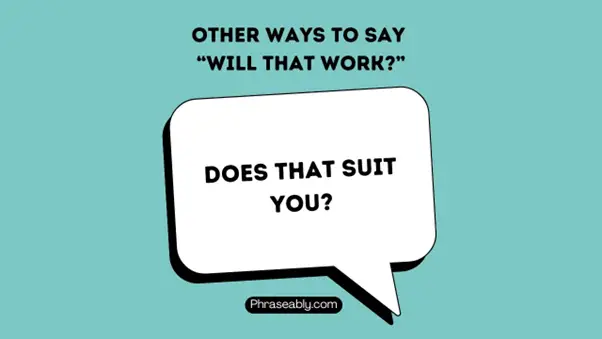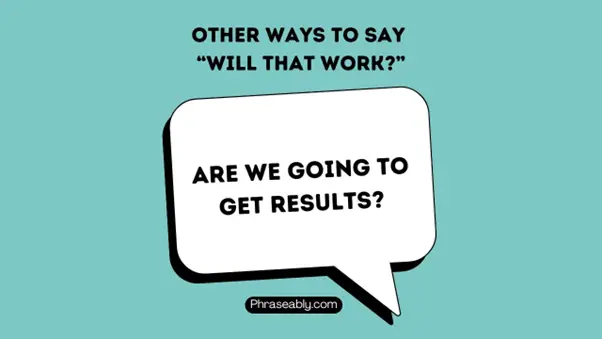The question “will that work?” is a simple way of asking if a plan, idea, or solution will be successful or effective in a particular situation.
You can also use the question when you’re trying to get validation from someone about an idea.
However, sometimes it’s better to use an alternative phrase instead of “Will that work?”, especially for clarity sake.
In this article, we’ve listed 15 different ways you can say “will that work” to suit different contexts and also provided tips on how you can use each one.
Key Takeaways
- If you want someone to validate a suggestion or idea you make, you can say “Will that suffice?” or “Does that make sense?”
- If you want to understand the details of a proposal, you can ask “Are we going to get results?”
The main issue with always saying “will that work?” is that it might be too vague.
Also, the tone of the question can sound a bit too uncertain. In more formal situations, it’s better to use something more professional.
Meanwhile, if you’re in a leadership or decision-making role, showing more confidence can help. Instead of asking, “Will that work?” you could use any of the suggestions in the list below:
List of the Best Other Ways to Say “Will That Work?”
- Does that suit you?
- Will that do?
- Can we go with that?
- Are you sure about that, or should I check again?
- Does that fit the bill?
- Will that suffice?
- Does that make sense?
- Does that check out?
- Do you really believe that, or are we just guessing?
- Can you work with that?
- Are we going to get results?
- Does that match what you had in mind?
- Are we on the same page?
- Does that hit the mark?
- I have my doubts.
Let’s now look at these suggestions one after the other so you can easily determine which is best for your scenario.
1. Does that suit you?

The question “Does that suit you?” is one of the best alternative ways to say “Will that work”
You can use this substitute when you’re trying to seek validation from someone about an idea or proposal you just shared with them.
It means you want to know if they are comfortable with the idea as per their discretion.
How to use:
- We can make the entire design have a green background. Does that suit you?
2. Will that do?
“Will that do?” is another simple way to ask “Will that work?” or “Is that okay?”
You can use it when you’re asking if someone is satisfied with a suggestion or if something is good enough for them.
It’s a way of checking if the person agrees or is comfortable with what you’ve proposed.
How to use:
- The idea is to have it filled to the brim. Will that do?
3. Can we go with that?
If you’re looking for a more casual way of confirming if the person agrees and if it’s okay to move forward with the plan, say “can we go with that.
You can use this question when you want to finalize a decision or confirm that everyone is on the same page.
How to use:
- The second option looks more solid for our brand voice. Can we go with that?
4. Are you sure about that, or should I check again?
Instead of just asking “will that work”, you can use this alternative question when you’re unsure if the person is certain about something and wants to make sure before moving forward.
It shows that you’re willing to double-check if necessary to avoid mistakes or misunderstandings.
How to use:
- I just read your document? Are you sure about that, or should I check again?
5. Does that fit the bill?

If your goal, when you say “will that work?”, is to ask if something meets the requirements or expectations, then you can use an interesting idiom such as “does that fit the bill?”
It’s a way to check if the idea or suggestion is acceptable and works for the situation.
How to use:
- I want to use the last machine to process the customer’s order. Does that fit the bill?
6. Will that suffice?
If you want to sound more formal, then ask, “will that suffice?”
It’s a professional way to check if what you’ve proposed or offered is adequate for the situation.
How to use:
- We could make the whole design have a green background. Will that suffice?
7. Does that make sense?
Instead of focusing on seeking validation from the person you’ve submitted your ideas to, you can simply ask them “does that make sense?”
If what you’ve explained suits them, they will say.
“Does that make sense?” is a common way of asking if someone understands or agrees with what you’ve said.
How to Use:
- I plan to finish the article before doing the designs and it has been proofread.
8. Do you really believe that, or are we just guessing?
Sometimes, we ask people “will that work” as a means to question whether they have enough confidence in their decision or if they’re just taking a chance without solid information.
That’s why it makes more sense to substitute “will that work” with this alternative phrase.
9. Can you work with that?
Alternatively, you can replace “will that work” with “can you work with that?” especially when asking if someone can manage or be okay with an idea or proposal.
We recommend using this phrase if your intention is to check how comfortable the person is with what’s been suggested or if they can make it work for them.
10. Are we going to get results?

For some people, asking “will that work” is coming from a place of wanting to confirm if an effort will produce the desired effect or meet expectations.
So you can shift the focus on the thing “working” and focus on “will it get the result you need”
11. Does that match what you had in mind?
There’s no real difference between “will that work” and “does that match what you had in mind?”
Only that the latter adds some perspective to the question.
So it effectively replaces “will that work” when asking if the idea or proposal aligns with what the person was expecting or envisioning.
12. Are we on the same page?
When you’re on the same page with someone, it’s an idiomatic expression which means to have the same kind of understanding about a situation as the other person.
So it’s a perfect thing to ask about when seeking validation about an idea. Instead of just asking “will that work?”
13. Does that hit the mark?
When someone hits the mark, it means to be successful in one’s attempt. This is exactly what you’d call “it worked.”
In other words, you can replace “will that work?” with “does that hit the mark” and still communicate the same idea.
14. I have my doubts
If the reason you want to ask “will that work?” is to express uncertainty or skepticism about something, then you can say “I have my doubts.”
This statement sounds firmer and it shows that you’re not fully convinced or sure about the idea or plan.
15. I’m not entirely sold on that
If you’re not fully convinced or sure about something, it’s natural to want to ask “Will that work?”
But it sounds more precise to say “I’m not entirely sold on that.”
It shows that you’re hesitant or have reservations about the idea, and you may need more convincing before agreeing to it.
The Bottom Line
It comes down to two main reasons:
- Are you asking “will that work” because you want confirmation if your idea fits someone’s opinion?
- Or are you asking it to get more understanding and see if the idea will be successful?
Your reason for asking will guide which alternative phrase you should use.
